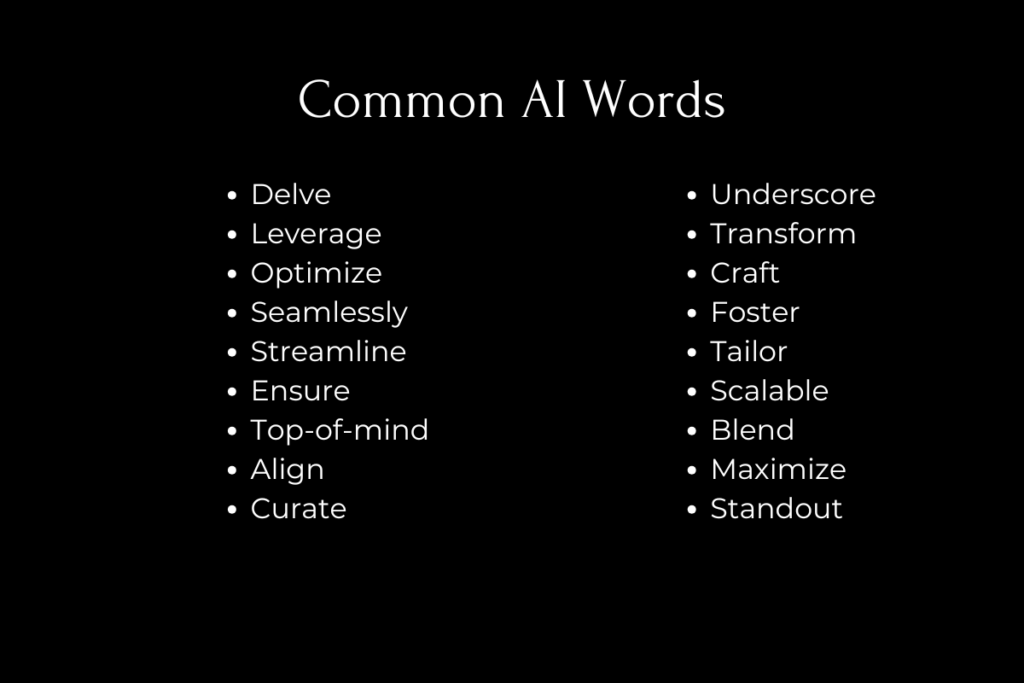“Machines are tools. They’re brilliant at the ‘what’ and ‘how.’ Only humans can answer the ‘why'”
– Alan Turing
Let’s jump right to it.
AI tools like ChatGPT are everywhere, and some are pretty impressive.
Many copywriters were concerned their profession would die when AI showed up on the scene.
I was one of them.
But AI’s impact on copywriting turned out to be different than expected.
So, what role does AI have in copywriting?
In this article, you will learn:
-
Where AI fits in copywriting
-
Pros and cons of AI tools
-
How AI impacts search rankings
Why Would I Hire a Copywriter When I Have ChatGPT?
When AI made its debut, many business owners were thrilled they could cut costs by ditching their copywriters.
Quickly, those dreams were crushed.
Why?
Because AI can’t sell anything on its own.
It doesn’t know how to make people laugh, cry, reflect on their past, dream about their future, or relate to humans.
In order to sell a product, you have to convince a consumer they need it.
AI is not very good at that.
Because AI is a robot.
So, while ChatGPT or other AI systems can spit out ideas for content, they can not create in-depth content.
Not everyone realizes AI tools are limited to information available through 2023.
That means they can’t keep up with breaking news, recent algorithm updates, or emerging industry trends—things every marketer needs to stay ahead—without human input and fact-checking.
Before you say, that’s not true . . .
Yes, some AI tools can use plugins to browse the internet or pull data in real time, often by integrating with APIs or third-party platforms like Google Analytics.
Plugins can help AI analyze keywords, check backlinks, and even connect to platforms like Google Analytics.
But, AI still needs human oversight to verify facts, interpret trends, and turn insights into successful strategies.
And most importantly, AI is colorless—incapable of creating anything truly compelling.

Google Has Its Eye on AI
Businesses who ditched their paid copywriters to save a buck and opted for AI-generated content are most likely seeing their Google rankings drop.
Google’s March 2024 algorithm update indirectly punishes websites that solely rely on AI-generated content.
Why?
Because AI alone just can’t meet Google’s quality standards.
It’s not that Google penalizes AI-generated content—it’s that it rewards high-quality, valuable content that serves users first.
Google’s concern is how well the content answers real questions, meets user needs, aligns with search intent, and is substantive and well-written.
Through its Helpful Content System, Google prioritizes work that’s created with people in mind, regardless of whether AI plays a role or not.
AI can be helpful, but Google’s spam policies still crack down on content that doesn’t add value for users.
Repetitive, low-quality, or irrelevant content might seem like a shortcut to rank quickly, but Google’s algorithms are tuned to recognize and rank down these tactics.
Boring content ranks lower, period.
SEO Strategies
You need a copywriter to create SEO strategies—things like keyword placement, link building, and performance tracking.
Here is where AI can provide support:
-
Generating keyword ideas. AI can quickly suggest options that a copywriter can refine using tools like Ahrefs or SEMrush to match search intent and rankings.
-
Organizing content structures. AI drafts outlines and frameworks for pillar pages that a copywriter can expand into detailed, optimized content.
-
Recommending internal and external links. AI can identify potential linking opportunities, and then a copywriter can adjust those links to strengthen SEO and build authority.
-
Supporting analytics. AI tools can process data when connected to plugins, and a copywriter interprets trends and adjusts strategies to optimize results.
AI is an incredibly useful tool that copywriters can—and should—use to increase productivity, generate concepts, and streamline workflows.

Why Copywriters Are In Demand
AI might be a smart parrot, but it’s still mimicking.
Copywriters, on the other hand, develop their skills over years of experience, trial, and error.
They give us something AI, on its own, is incapable of delivering—relatable content.
1. Understanding the Human Psyche
Copywriters know what what brings readers comfort, what scares them, and what inspires them.
They can do this because they know what brings peace to their heart, what ignites their children’s anxiety, and what fuels their best friend’s fire.
2. Brand Voice Magic
Anyone can string sentences together but create a unique brand voice?
That’s a different skill entirely.
Copywriters work to build a voice that’s not just catchy but is genuinely representative of the brand—relatable, authentic, and memorable.
AI can imitate, but it can’t create a voice that feels real.
3. Creativity Without Limits
AI is capable of creating phrases that it believes are clever, but there’s no spark behind it.
Copywriters find the details and perspectives that make content feel fresh and worthy of a reader’s time.
AI is to a copywriter what a calculator is to a mathematician—a resourceful assistant, not a replacement.
It’s Not Hard to Spot AI-Generated Content
Depending what your occupation is or how much you read online content, you may or may not be able to quickly sniff out AI generated content.
The overly long sentences, redundant word choices, and, yes, those cringey, unnatural sentences filled with appositive phrases —– “Vacationing in Florida provides the ultimate escape, seamlessly combining a blend of sun-soaked beaches and vibrant nightlife.” —– is AI’s go-to writing style.
Come on—no one talks like that, and we definitely don’t write like that.
This style of writing is the quickest way to kill your brand’s voice.

What Are the Advantages and Disadvantages of AI for Copywriting?
Like any technological advancement, using AI for copywriting comes with both benefits and drawbacks.
In light of that, Let’s take a look at the pros and cons of using AI for copywriting.
Pros of Using AI in Copywriting
-
Time Efficiency
AI can quickly generate the bones of content, reducing the time it takes to create copy, especially for repetitive or formulaic tasks.
-
SEO Assistance
AI can assist in optimizing content for search engines by suggesting keywords and linking opportunities.
-
Error Reduction
AI can help minimize spelling and grammatical mistakes, and suggest word choices.
-
Idea Generator
AI can create lists of ideas for blogs and images when writers get stuck.
Cons of Using AI in Copywriting
-
Lack of Creativity
AI struggles with producing truly creative or innovative content. It relies on existing patterns and data, which significantly limits originality in writing.
-
Quality Control Issues
AI-generated content may contain awkward phrasing or inaccuracies that require human oversight and editing to make sure the content meets quality standards.
-
Limited Nuance
AI has difficulty conveying subtle nuances, humor, or cultural references that require deep understanding. This often leads to content that feels flat or off the mark.
-
Dependence on Algorithms
AI relies heavily on algorithms and training data, meaning that its effectiveness can be limited by the quality and scope of the information it’s given.
-
SEO Strategy Limitations
AI can’t properly structure an SEO strategy, which leads to keyword stuffing or poor keyword placement that harms content quality and negatively affects search rankings.

It Doesn’t Have to be AI vs. Copywriters – They Are the Ultimate Duo
AI isn’t the bad guy here.
When teamed up with a skilled copywriter, it’s like having an extra brainstorming buddy who handles the basic stuff so you can focus on the big picture.
AI can assist with mundane tasks like idea lists or competitor research.
With AI handling the monotonous work, copywriters have more time to dig into what readers want answers to, build strategy, and let their creativity shape the messaging.
Copywriting is in no danger of being a profession of the past.
However, copywriters may be expected to perform at an even higher level since they have a tool as advanced as AI.
In a Nutshell
Not a chance.
AI is helpful resource, but it’s the humans behind the words who give them meaning.
